
Ida Lupino was a British actress, director, writer, and producer. Throughout her 48-year career, she appeared in 59 films and directed eight, working primarily in the United States, where she became a citizen in 1948. She is widely regarded as the most prominent female filmmaker working in the 1950s during the Hollywood studio system. With her independent production company, she co-wrote and co-produced several social-message films and became the first woman to direct a film noir, The Hitch-Hiker, in 1953.

Louis Charles Hayward was a South African-born, British-American actor.

Howard Green Duff was an American actor.

Henry William George Lupino professionally Lupino Lane, was an English actor and theatre manager, and a member of the famous Lupino family, which eventually included his cousin, the screenwriter/director/actress Ida Lupino. Lane started out as a child performer, known as 'Little Nipper', and went on to appear in a wide range of theatrical, music hall and film performances. Increasingly celebrated for his silent comedy short subjects, he is best known in the United Kingdom for playing Bill Snibson in the play and film Me and My Girl, which popularized the song and dance routine "The Lambeth Walk".

The Lupino family is a British theatre family which traces its roots to an Italian émigré of the early 17th century. The "Lupino" name is derived from two unrelated families:
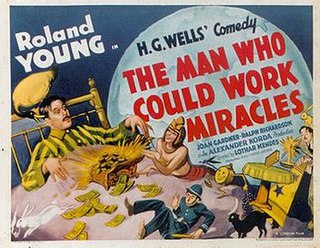
The Man Who Could Work Miracles is a 1937 British fantasy comedy film directed by Lothar Mendes and produced by Alexander Korda. The film stars Roland Young with a cast of supporting players including Sir Ralph Richardson. Possibly the best-known of Mendes' 20 films, it is an expanded version of H. G. Wells's 1898 short story of the same name. Wells worked on the adaptation, revising the plot to reflect his socialist frustrations with the British upper class and the growing threats of communism and fascism in Europe.

Stanley Richard Lupino Hook, known professionally as Stanley Lupino, was an English actor, dancer, singer, librettist, director and short story writer. During the 1930s, Lupino appeared in a successful series of musical comedy films, often based on his already popular stage shows.

The Sea Wolf is a 1941 American adventure drama film adaptation of Jack London's 1904 novel The Sea-Wolf with Edward G. Robinson, Ida Lupino, John Garfield, and Alexander Knox making his debut in an American film. The film was written by Robert Rossen and directed by Michael Curtiz.

Wallace Lupino was a British-born stage and film actor who was a member of the Lupino family. He appeared in 63 films between 1918 and 1945, most often with his older brother, Lupino Lane. He was born in Edinburgh, Scotland, and died in Ashford, Kent, England.
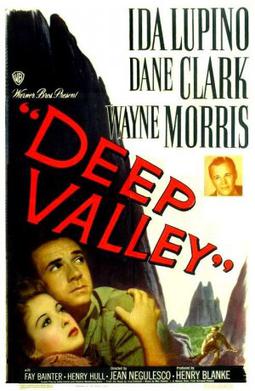
Deep Valley is a 1947 American drama film directed by Jean Negulesco and starring Ida Lupino, Dane Clark and Wayne Morris. It was produced and released by Warner Bros. A young woman lives unhappily with her embittered parents in an isolated rural home until an escaped convict changes her dreary existence. It was based on the novel of the same name by Dan Totheroh.
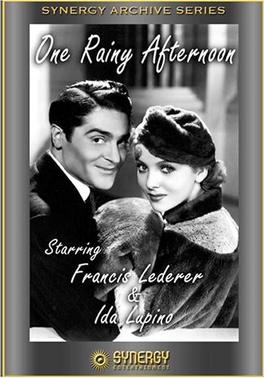
One Rainy Afternoon is a 1936 American romantic comedy film directed by Rowland V. Lee, starring Francis Lederer and Ida Lupino, and featuring Hugh Herbert, Roland Young and Erik Rhodes. It also marked the last film appearance by actress Florence Lawrence, who died in 1938, who had an uncredited bit role in the film. It was written by Stephen Morehouse Avery, with additional dialogue by Maurice Hanline, from the screenplay for the 1935 French film Monsieur Sans-Gêne by Emeric Pressburger and René Pujol, which was based on the story "The Satyr" by Pressburger. The film was reissued in 1948 as Matinee Scandal.
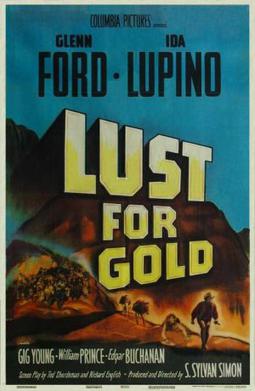
Lust for Gold is a 1949 American Western film directed by S. Sylvan Simon and starring Ida Lupino and Glenn Ford. The film is about the legendary Lost Dutchman gold mine, starring Ford as the "Dutchman" and Lupino as the woman he loves. The historical events are seen through a framing device set in the contemporary 1940s. It was based on the book Thunder God's Gold by Barry Storm. Part of the film was shot on location in Arizona's Superstition Mountains.

Julie Aileen Kelly, known professionally as Judy Kelly, was an Australian-born British actress. She arrived in Britain in 1932 after winning a competition organised by the Australian British Empire Films, which included 3 months tuition at the British International Studios at Elstree. She appeared in a number of films for British International Pictures during the 1930s. She was sometimes cast as a love interest for the comedian Leslie Fuller, and also appeared alongside the musical stars Gene Gerrard and Stanley Lupino.

George Barry Lupino-Hook was an English comedian and film actor, and a notable Pantomime dame.

Hold My Hand is a 1938 British musical comedy film directed by Thornton Freeland and starring Stanley Lupino, Fred Emney and Barbara Blair. It was based on a musical play by Lupino.
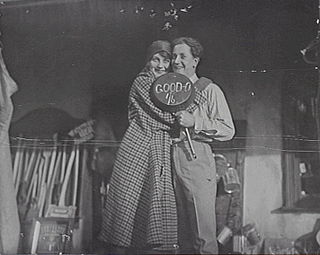
Barry Butts In is a 1919 Australian film comedy from director Beaumont Smith starring British vaudevillian Barry Lupino, who was then visiting Australian. It is considered a lost film.
Bed and Breakfast is a 1938 British drama film directed by Walter West and starring Daphne Courtney, Barry Lupino and Frank Miller. It depicts the lives of the inhabitants in a boarding house. It was the last appearance of the silent star Mabel Poulton in a feature film as well as the last to be directed by West. The film was made at Southall Studios, with production beginning in May 1936.
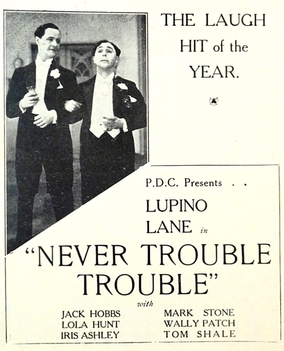
Never Trouble Trouble is a 1931 British comedy film directed by Lupino Lane and starring Lane, Renee Clama and Jack Hobbs. It was shot at the Cricklewood Studios in London.
No Lady is a 1931 British comedy film directed by Lupino Lane and starring Lane, Renee Clama and Sari Maritza. It was made at Lime Grove Studios in Shepherd's Bush by Gaumont British, a company linked to Gainsborough Pictures. The film sets were designed by art director Andrew Mazzei. It was popular enough to be re-released in 1943. While possibly originally intended to top the bill, it was released as a second feature and is classified as a quota quickie.
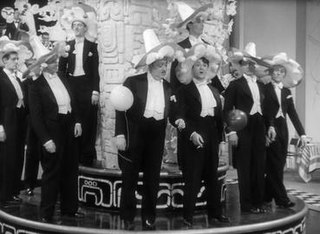
Honeymoon for Three is a 1935 British musical comedy film directed by Leo Mittler and starring Stanley Lupino, Aileen Marson and Jack Melford. It was made at Ealing Studios. The film's sets were designed by J. Elder Wills. It was the first film Lupino made after leaving British International Pictures and trying his luck as an independent producer.

















